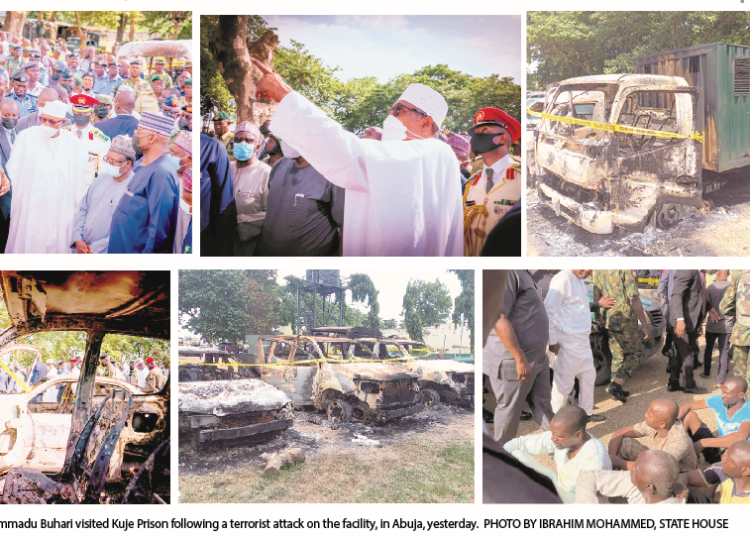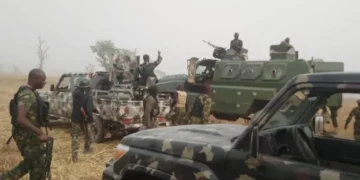As Americans in the United States and around the world celebrated their Independence Day, news of the abduction of yet another Catholic priest in Kaduna State made headlines in Nigeria. A couple of days earlier, another priest had been kidnapped in Edo State bringing the total number of kidnapped Catholic priest between June 2021 and July 2022 to over 22.
Just days to the Eid-El-Kabir celebrations, bandits in Katsina State attacked President Buhari’s advance team of security guards, protocol and media officers ahead of the President’s trip to Daura for the Sallah celebration. They also attacked and burned down two primary health centers in Batsari Local Government Area of the state ahead of the President’s visit. This forced the Katsina State government to close down a whooping 69 health centers.
At about 10:20 pm on the 5th of July, residents of Kuje within the Federal Capital Territory heard a loud explosion. It was suspected to be a high caliber bomb and was followed by two more explosions. The ensuing sporadic gunfire sent residents scampering for safety. By the time the dust settled, over 800 of the 994 inmates including Boko Haram commanders had reportedly escaped from the Kuje correctional facility following the jailbreak. An NSCDC officer and four inmates were also killed during the attack.
Now, these are just recent and high profile targets that has made headlines in recent weeks. There have been countless cases of kidnappings/abductions, armed robbery, banditry among others that have sailed below the radar. Apparently, the terrorists/bandits have continued to gain more ground while security agents are killed in numbers during attacks by the insurgents and innocent Nigerians falling victims in the process.
No doubt, Nigeria is ravaged by incessant terrorist attacks perpetrated by Boko Haram and their allies, the Islamic State in West Africa (ISWAP) coupled with banditry which has morphed into a criminal franchise of kidnapping for ransom. Apart from these groups, there are other subliminal groups perpetuating havoc on Nigerians on a daily basis. Take for instance the activities of the “one chance” group who operate mainly in Lagos and Abuja. Social media is rife with tales of unsuspecting Nigerians entering cabs and buses, and being beaten or disposed of their valuables or sometimes killed.
Investigator Reveals Startling Details About Kuje Prison Attack
Since the beginning of the year also, ritual murders have been on the increase. There have been reports and cases of corpses missing a head, limbs or some other parts of the body which is not unconnected to ritual purposes. In Abuja in particular, there have been several cases of armed robbery attacks in homes both during the day and the cover of darkness. Kidnappings have sadly turned into a daily occurrence and the criminals have been emboldened so much so that they have begun to notify their victim’s days before they attack them.
The prevailing insecurity situation is also affecting the economy. Recently, The International Monetary Fund (IMF) expressed concern over the deteriorating level of security conditions in Nigeria, stressing that it was contributing to the subdued Gross Domestic Product (GDP) figures in the country. Similarly, many countries have issued “red alerts” to their citizens in Nigeria over the rising insecurity levels. Countries like the US, UK, Canada and Turkey have all issued warning alerts to their citizens.
This has further dampened our image abroad and the global community is already apprehensive about the spike in terrorist’s activities following the attack on Kuje Custodial Centre. The Country’s image is obviously at stake as countries will not encourage their citizens to come in and invest in the country with the prevailing insecurity situation. Not until we show commitment to curbing the rising levels of insecurity, we will continue to suffer lack of influence within the diplomatic circle which will have a ripple effect on our economy.
Beyond condemnation and press releases, what is being done to bring the perpetuators of this criminality to book? Other countries are taking practical steps to assure their citizens of their safety and catch perpetuators of crime. The recent July 4th attacker that killed seven people and injured many others in the US has been identified, caught and charged with seven counts of murder. In Japan, the security levels being taken to unravel the factors that resulted in the recent assassination of Shinzo Abe, goes to show how the country takes security concerns.
Since the attack on Kuje Custodial Centre and other attacks, no one has been arrested. This has given rise to whispers that a possible complicity by some persons in the security circles. Since the Church attack in Ondo state also, beyond the attribution of the attack to ISWAP, no one have been arrested. In February this year, the Federal Government said it had uncovered 96 companies and individuals sponsoring Boko Haram and other terrorists in the country. Since then, there has been nothing more heard or seen to be done.
The current state of insecurity calls for serious concern now more than ever. Criminal elements whether bandits or ISWAP have shot down a military aircraft, attacked military facilities in Kaduna and the Kaduna Airport and severally attacked the Abuja-Kaduna train services, killing and abducting passengers as well as stopping the train service. They have turned the Abuja-Kaduna and Birin Gwari roads in Kaduna into a gold mine of sorts where they kidnap people indiscriminately. They have kidnapped clerics, attacked places of worship as well as government facilities.
The recent attack on the Kuje custodial center leaves more questions than answers. According to reports, the attackers operated for more than an hour. Where were the military guards that should have at least put up a measure of resistance? Where were the Directorate of State Services, (DSS), Police and military intelligence groups which should have intercepted them before they struck? Where were the reinforcements that should have helped to neutralize the attackers? Why is there no Closed Circuit Television (CCTV) facility at strategic places in and round the prison? In fact, why in this world were high risk prisoners such as terrorists kept in a medium security facility?
The attack on the correctional facility is symptomatic of the failure of the country’s security architecture. No wonder many have begun to call on Nigerians to arm themselves. However this will further exacerbate the prevailing situation and is no way a solution to the current security challenge we are facing. Perhaps decentralized security architecture might just be the way to go, since the prevailing centered structure is fraught with too many challenges. Those in authority and saddled with the responsibility of protecting the lives and properties of Nigerians needs to do more, think outside the box towards tackling the security challenges facing the country.
With the large number of convicts and terrorists on the loose, how safe are the residents of Abuja, its environs as well as Nigerians at large? Does the attack on Kuje custodial center indicate an ominous harbinger that more is to come? With scores of escaped Boko Haram commanders rejoining members of their group, what does this portend for the country’s security? We all need to be extremely security conscious during these times as we go about our day-to-day activities.
Nigeria has never been more insecure as it is presently. The government has a duty to “wake from its slumber” and be outraged by the bloodletting and listen to the cries of desperate Nigerians asking for some measure of security across the land. One urges the President and the government to really listen to the cries of the people of this great country and fulfil their fundamental obligation of protecting lives and providing security. The state is duty bound to act with discernment in responding to the increasing violence and effectively clamping down on insecurity as a matter of urgency. The government has to devise a mechanism for immediate action in order to avert an even bigger human catastrophe of an unprecedented magnitude.
…As we witness yet another outrageous episode of insecurity in our country, one hopes that the blood of Nigerians spilt will serve as a wake up call and that the pain of our people will be seen with open eyes by those responsible from waking up from their deep slumber.





